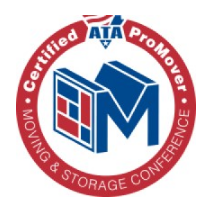Handy Interstate Moving Tips for First-Time Movers in 2023

One of the main reasons people perform an interstate move is the promise of fresh opportunities that await them at their new address. Careful planning and organization are vital during this significant life event.
Allow us to offer practical tips to ensure a successful (and far less stressful) experience.
The Ultimate Guide to Interstate Moving Tips

Moving across state lines can be quite overwhelming, but you can ensure a smooth and successful transition by following the right interstate moving tips and tricks. This guide is meant to provide essential advice on achieving a smooth move.
NOTE: It takes much more planning to successfully pull off an interstate move than an intrastate one. Local moves or moving within the same state is also a lot cheaper than moving interstate.
Creating a Detailed Moving Process Plan
Embarking on a big move, whether down the street or across the country, requires careful planning to ensure a smooth and efficient transition. You will need to create a comprehensive interstate moving checklist that considers everything related to your endeavor.
This checklist will be your comprehensive guide to planning an interstate move, covering potential expenses, moving truck companies, contact and mailing information to update, school and work options, and more. You will also need to research specialized tips for senior moves that take any physical impediments or issues into account.
Having a well-structured plan becomes even more crucial if you’ve decided to take the DIY route. From creating a packing plan to staying organized and adhering to your moving budget, this section will guide you in developing a detailed strategy that suits your needs.
Setting a Realistic Timeline
When planning an interstate move, creating a realistic timeline is crucial to ensure a smooth transition, especially if you’re busy with work or trying to get your kids settled before school starts. Moving interstate involves several logistical factors, such as updating your new address, arranging transportation, and acquiring the necessary materials.
A well-structured timeline allows you to dedicate sufficient time to each task, helping you stay organized and save time and money in the long run.
Budgeting for Moving Costs
When planning a move, it’s essential to carefully plan your budget for the various expenses involved. Start by creating a detailed moving checklist to identify all the necessary costs.
Consider expenses such as boxes and other packing materials. If you’re moving interstate, research moving companies in your area, as well as the costs of hiring professional movers or renting a truck.
Remember that additional costs may arise throughout the entire move, like additional storage fees or insurance coverage needs.
Researching Your New State and Local Area
Conducting thorough research is crucial for ensuring a smooth transition before moving from your current address to a new state. Connect with a trusted real estate agent who can provide valuable insights about the housing market and neighborhoods in the state you’ll be moving to.
It’s also best to contact the property’s previous owners and ask them about the neighborhood. You should also familiarize yourself with state laws and regulations within the new city to ensure compliance.
Packing and Organizing Tips

When it comes to interstate moves, packing and organizing effectively are critical to ensuring a successful transition. Start early with the right moving supplies, such as rental trucks, to save time, effort, and money.
This section offers more tips on efficiently packing and organizing your belongings, maximizing space, and minimizing the risk of damage during transportation.
Decluttering Before the Move
Before embarking on long-distance moving, decluttering is crucial to free up space and lower moving prices. By carefully evaluating your belongings and purging unnecessary items, you can reduce the size and weight of your load, resulting in lower moving costs overall.
Decluttering also allows you to start fresh, freeing you from the burden of unnecessary possessions. Take the time to assess each item and piece of furniture to decide whether to keep, donate, sell, or discard it.
Gathering Necessary Packing Supplies
Before interstate moving, it’s crucial to gather the necessary packing supplies to ensure the safe transport of belongings and furniture. Start packing your possessions in boxes of various sizes to accommodate different types of items.
Bubble wrap and packing paper provide essential cushioning to protect items during transit. Secure packing tape, markers, and labels as well for sealing and identifying boxes.
Packing Hacks for Different Items
There are a few helpful hacks to streamline the whole process when it comes to packing essential items and household goods for a move. You can start by grouping similar items and labeling these accordingly to make unpacking easier. Utilize smaller containers within larger ones to maximize space.
Consider using bubble wrap or padding to protect delicate or valuable belongings. If needed, temporary storage can be an option for items not immediately required in your new real estate.
Finally, some moving companies provide additional services, such as packing and unpacking assistance, to further simplify this.
Labeling and Inventory Management
Labeling and inventory management are crucial aspects of an organized and efficient move. Labeling each box with its contents and the room it belongs in will help you make your new house a home in record time.
NOTE: Consider using color-coded labels or a numbering system for even greater organization levels.
It’s also best to maintain an inventory list or spreadsheet that tracks all your belongings, including important details like the box number and contents.
Choosing a Reliable Moving Company
When it comes to achieving a successful move, it’s vital to secure professional help. When you hire professionals, you ensure expertise and efficiency in handling your belongings. Additionally, they are required if you do not have a driver’s license and can’t move independently.
Hire reliable interstate movers and packers and avail of professional interstate relocation services to ensure a smooth load, trip, and move-in. With different providers offering their services, though, it’s vital to conduct thorough research and compare prices to choose a reliable moving company to address your needs in a way that won’t break the bank.
Comparing Quotes and Reviews When Hiring Professional Movers
When hiring moving services, it’s essential to compare the cost and customer reviews to make an informed decision. Request the cost from multiple interstate movers to compare their services. Pay attention to included services, additional charges, and options for full value protection.
Additionally, take the time to read reviews and testimonials from previous customers to gauge the movers’ reliability and customer satisfaction.
Understanding Contract Terms and Conditions
When entering into a contract with an interstate moving company, it is crucial to understand the terms and conditions thoroughly. Carefully review the contract to comprehend the scope of services, payment terms, cancellation policy, liability coverage, and any additional cost.
Note important details such as delivery dates, insurance options, and any limitations or restrictions.
Ensuring Insurance Coverage
Ensuring proper coverage is essential for protecting your belongings during transit. These may come at an additional cost, but it would be worth it.
Verify the insurance options provided and understand the extent of coverage offered. Evaluate whether additional insurance is necessary to safeguard valuable items.Review the terms and conditions of the insurance policy, including deductibles and claims procedures.
Making the Moving Day Smooth and Stress-Free
Moving day can be a whirlwind of activity and emotions. However, proper planning and organization can make it a smooth and stress-free experience. This section provides essential tips and strategies to help you navigate the logistics of this day efficiently.
Preparing an Essentials Box

When moving, it’s crucial to pack an essentials box containing items you’ll need immediately upon arrival at your new home. Include necessities such as toiletries, a change of clothes, important documents, basic kitchen supplies, and any essential medications.
Pack snacks, a first aid kit, and basic cleaning supplies as well. Label the box clearly and keep it easily accessible during the move.
Communicating with the Moving Crew
Clear and effective communication with the moving crew is crucial for a successful relocation. Discuss important details and expectations beforehand, such as parking arrangements and fragile or valuable items requiring special care. On a moving day, be available to supervise, answer questions, provide directions, and offer any necessary guidance.
Managing Pets and Children During the Move
It’s essential to have a plan in place when moving interstate with pets and children. Keep pets in a secure and comfortable area away from the commotion. Consider enlisting the help of a trusted family member to care for them during the move.
Similarly, designate a safe and supervised space for children, ensuring their snacks, toys, and activities are there to meet their needs.
Settling Into Your New Home
Moving doesn’t end once you arrive at your new destination. It’s time to settle in and make it feel like home. Here are some tips to help you navigate the process smoothly.
Updating Your Address and Other Important Documents
After moving to a new home, updating your address and documents is crucial. Transfer utilities by contacting local public utility companies and utility providers (like the United States Postal Service) to ensure a seamless transition of services.
You should also contact your local DMV to update your driver’s license and vehicle registration with your new address. Notify your credit card company and update your address with the post office to avoid disruptions.
Unpacking and Organizing Your New Space
Start by prioritizing rooms and unpacking essential items first. Create a systematic approach, unpacking one box at a time, and find designated places for each item as you go. Consider functional and aesthetic organization methods to maximize space and create a comfortable living environment.
Exploring Your New Community
As you settle into your new home, take the opportunity to explore your new community and connect with new friends. Engage in local activities, join community groups or clubs, and attend neighborhood events to meet like-minded individuals.
Explore nearby parks, shops, and restaurants to familiarize yourself with the area. Utilize online platforms and social media to discover local communities and events.
Frequently Asked Questions
Explore these frequently asked questions to find the information you need in a concise and accessible manner.
What Is the Best Time of Year for an Interstate Move?
The best time of year for an interstate move depends on various factors, including your circumstances and preferences. However, many people find that planning their move during the spring or fall seasons can be advantageous, as it typically offers milder weather and lower demand for moving services.
Additionally, consider checking the validity of your driver’s license and ensuring it will be up-to-date during your move to avoid potential issues.
How Can I Save Money on My Interstate Move?
Consider decluttering and removing unnecessary items before packing to save money on your interstate move. Compare quotes from different interstate moving companies to find the most affordable option. If feasible, go for a DIY approach, as it can help reduce interstate moving costs.
Lastly, plan your move during off-peak seasons when prices are typically lower.
How Do I Choose the Right Moving Company for an Interstate Move?
When choosing a mover, consider their experience, reputation, licenses, insurance, and if they offer services that meet your specific needs. Read reviews, seek recommendations to gauge customer satisfaction, and gather multiple quotes for cost comparisons.
How Do I Handle Valuable or Fragile Items During an Interstate Move?
Take extra precautions to handle valuable or fragile items during an interstate move. Use the appropriate packing materials. Clearly label these boxes fragile and inform movers about their special handling needs.
What Should I Do if I Encounter Issues With the Moving Company During My Interstate Move?
If you encounter issues with the moving company, like rude behavior or mishandling, address the situation immediately. Start by documenting any problems or damages with photos, videos, and written records. Communicate your concerns and grievances with the company’s customer service.
If necessary, escalate the issue to a higher management level or seek assistance from a regulatory agency and keep all relevant documents for your reference.
Conclusion
From planning and budgeting to selecting the right moving company and staying organized, being well-prepared and informed is crucial. Following the guidelines and tips outlined in this guide can significantly enhance your chances of a successful and stress-free transition.
Remember to update documents, explore your new community, and communicate effectively with the moving crew. By utilizing these strategies, you can turn your interstate move into a smooth and positive experience, setting the stage for a fresh start in your new home.
Related Articles
Moving Out Soon? Your Guide to Start Saving Today

Moving out is a thrilling milestone that brings both excitement and financial challenges. Proper preparation and strategic saving are crucial for a smooth transition to independent living, requiring more than just accumulating a lump sum. Beginning this process requires a thorough approach, from evaluating your current financial circumstances to preparing for lasting stability. By implementing […]
Read MoreFirst Time Moving Out? Your Essential Checklist & Guide

Stepping out on your own for the first time is a thrilling adventure that marks the beginning of true independence. It’s a journey filled with excitement, but it also comes with its fair share of challenges that require thoughtful preparation and planning. Moving from your family home to your own space involves more than just […]
Read More




